What if I told you the choice between Systeme and ClickFunnels 2.0 comes down to small details that make a big difference?
I’ve used both.
Tested everything.
And I’m sharing what I learned.
| Features | Systeme.io | ClickFunnels 2.0 |
| Starting price | Free plan available, paid plans start at $27/mo | Starts at $97/mo |
| Transaction fees | 0% | $0.01 for integrations + video hosting fees |
| Mobile apps | No native mobile app | No native mobile app |
| Courses | Yes (with community features and comments) | Yes (professional design, no community features) |
| Communities | Yes (built-in discussion areas) | No community features |
| Explore 👉 | 🔗 Explore Systeme | 🔗 Explore ClickFunnels |
Quick Decision
What I like about Systeme over ClickFunnels 👍
- Free plan with real value: Systeme offers a free plan (ClickFunnels doesn’t) with a solid affiliate program, unlimited students/content/emails, up to 3 sales funnels (15 steps each), and a custom website.
- Beginner-friendly interface: Systeme is more intuitive with a gentler learning curve than ClickFunnels, perfect for beginners.
- Free email marketing: Send unlimited emails and manage up to 2,000 contacts for free before paying anything.
- Simple automation setup: Build funnel steps quickly with simple, intuitive workflows without complexity overload.
- Built-in community features: Unlike ClickFunnels, Systeme includes comments, discussions, and community spaces where you and students can interact.
- Budget-friendly pricing: Systeme’s unlimited plan costs $97/month compared to ClickFunnels ($208/month) and Kajabi ($400/month). Systeme offers 4 flexible plans that grow with your business.
What I like about ClickFunnels over Systeme 👍
- Advanced page customization: While Systeme lets you build free websites, ClickFunnels offers more design flexibility and customization options.
- Professional funnel templates: Multiple templates tailored to different customer segments give you sophisticated starting points.
- Comprehensive analytics dashboard: See what’s happening in your business with live stats and detailed insights that outperform Systeme’s offering.
- Superior page building experience: More templates, elements, and an Elementor-like interface for creating polished designs.
- Advanced A/B testing: Split test funnel steps, workflows, checkout pages, and email elements including subject lines and opt-ins.
- Ecommerce management: A streamlined store that organizes all courses, products, and services in one place for easy customer access.
- Extensive third-party integrations: More integrations than Systeme to connect with tools you need or already use.
Similarities
Consider the following:
- All-in-one platforms: Both help you run your online business with minimal extra tools. They include funnels, websites, email marketing, affiliate management, and conversion tools.
- Course creation: Create, manage, and scale online courses and content businesses.
- Sell everything: Both let you sell digital and physical products (fulfillment handled by third parties).
- Unlimited offers: No limit on courses, products, workflows, pages, and emails you can create and sell (based on your plan).
Both are solid, less expensive alternatives to Kajabi. But they differ in ways that make one better for your specific needs.
Upfront bottom line
ClickFunnels targets advanced business owners with sophisticated funnels, marketing automation, and landing page building.
Systeme focuses on user-friendliness, offering similar capabilities at a much lower cost.
Let’s dive deeper into ClickFunnels vs Systeme to help you decide.
Overview

Systeme is an all-in-one platform that helps you start, run, and scale your online business without spending hundreds monthly.
With Systeme.io, you can create unlimited courses, build websites, set up sales funnels, automate marketing, run affiliate programs, and more – all in one place.

Start free with Systeme today
Build unlimited funnels, send emails, and create courses without spending a dime on the free plan.
Verified

ClickFunnels positions itself as a complete platform for online businesses.
They recently expanded to include courses and membership sites with ClickFunnels 2.0. You can see a quick comparison of ClickFunnels 1.0 and 2.0 here.
Test ClickFunnels 2.0 risk-free
Access advanced funnel building, automation, and analytics tools with a 14-day free trial and money-back guarantee.
Verified
Funnel building
Who wins at funnel building? Let’s break it down.
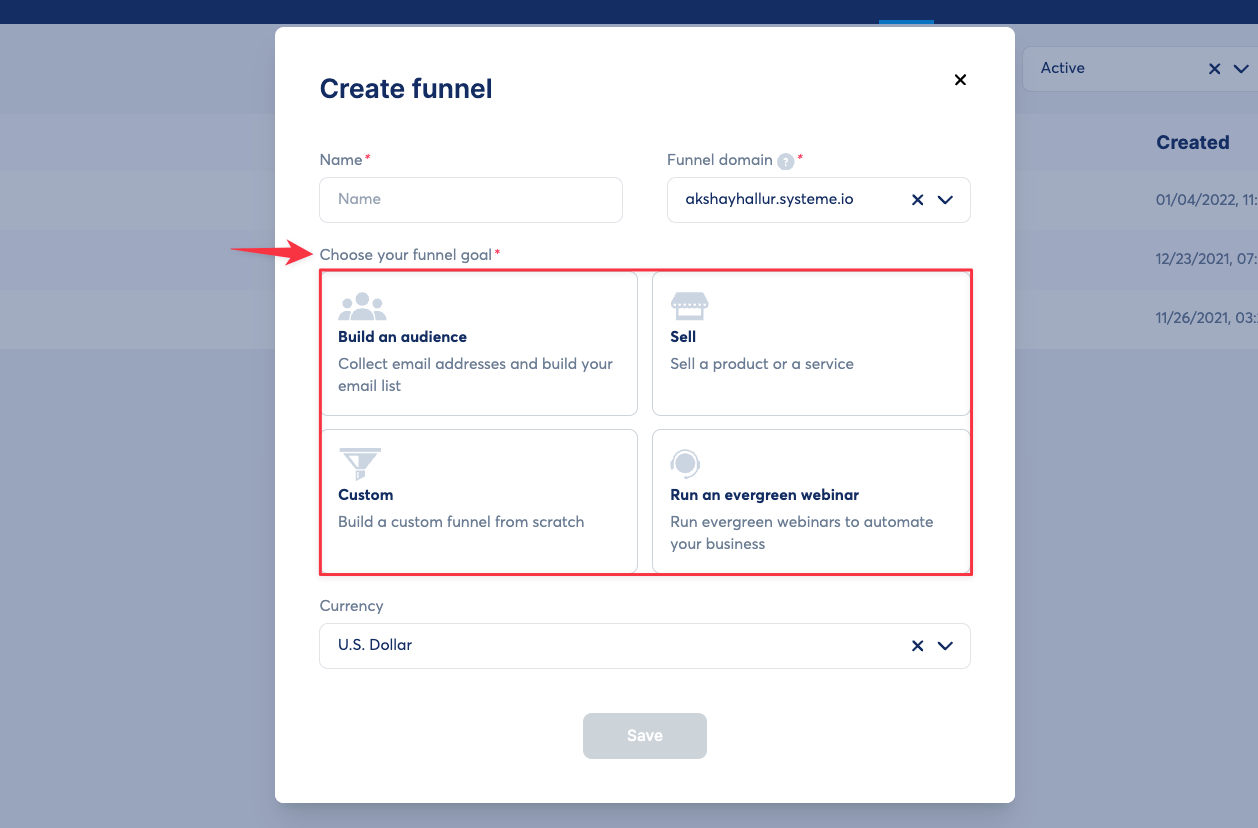
Systeme lets you create sales funnels based on four clear goals:
- Build an audience (email list)
- Sell a product or service
- Build a custom funnel from scratch
- Run a webinar funnel
You can also run deadline funnels for limited-time offers. Split testing helps you figure out which strategies work best.
The beauty of Systeme? Everything connects seamlessly.
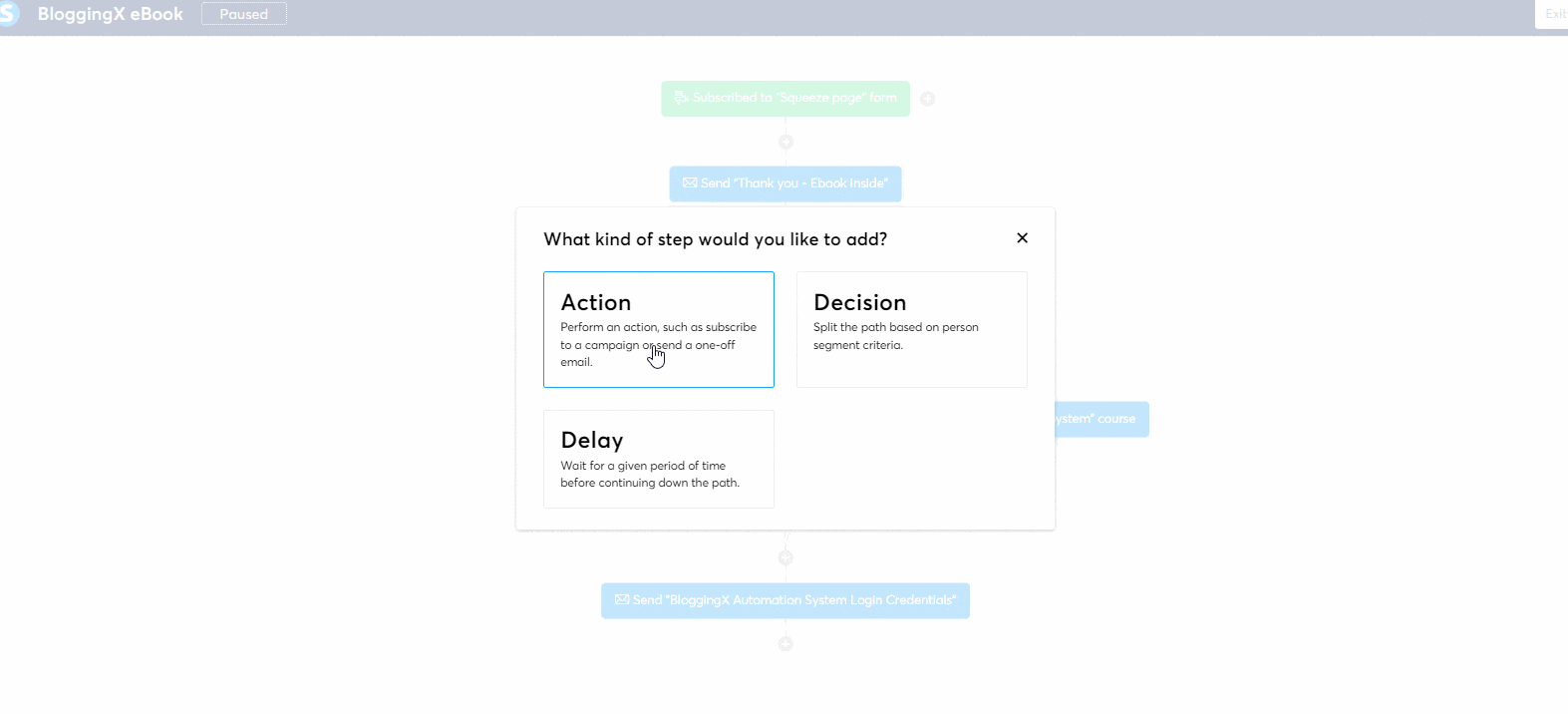
Your email marketing connects directly with your sales funnels.

Set up rules and workflows to trigger specific automations in your email sequences with just a few clicks.
Now.
ClickFunnels takes it to the next level.
It delivers superior tagging, automation, segmentation, email marketing and funnel automation tools.
Everything’s organized in one place through The FunnelHub.
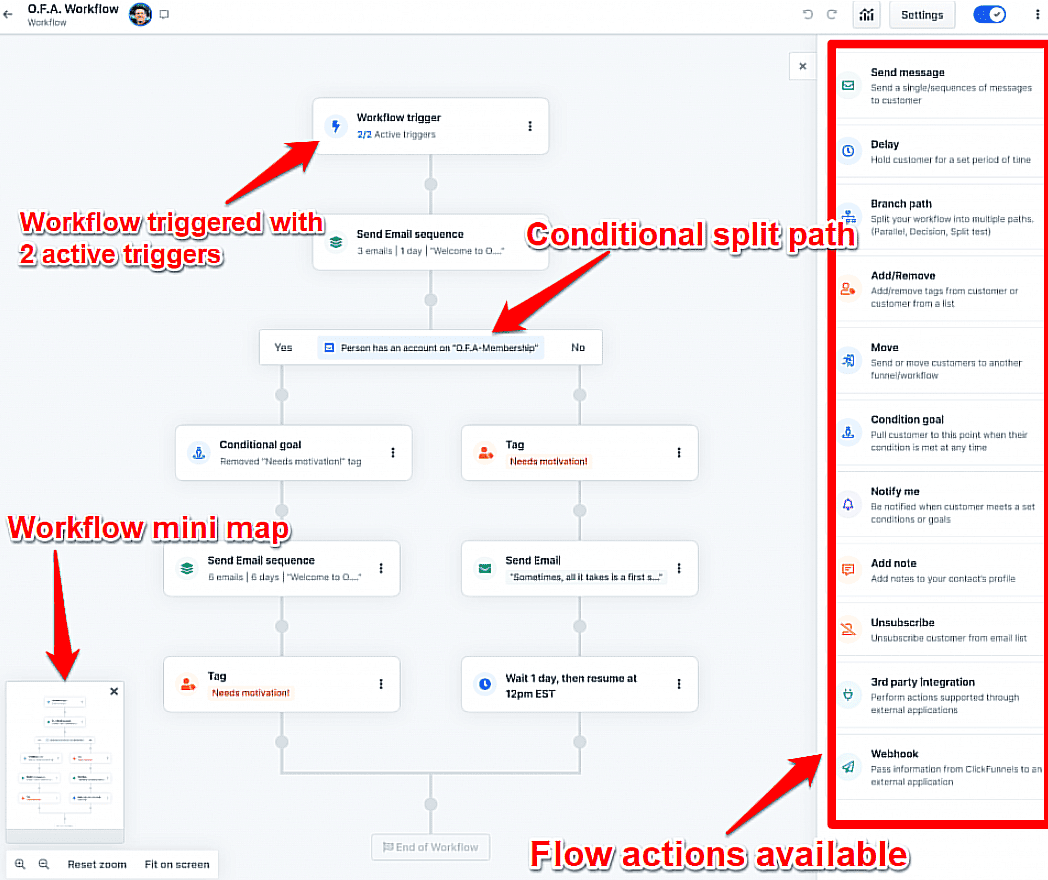
You can set up rules and triggers across multiple funnels that run automatically without your constant attention.
You can also combine funnels and workflows for advanced capabilities including conditional split paths (split testing funnel steps) and follow-up funnels (campaigns).
ClickFunnels pioneered funnel building. With ClickFunnels 2.0, they’ve significantly upgraded the entire system.
🏆 Winner: ClickFunnels. It delivers superior automation, sophisticated tagging, and advanced funnel complexity that serious marketers need. While Systeme offers solid basics, ClickFunnels’ professional-grade capabilities and FunnelHub organization justify the higher cost for complex campaigns.
Email marketing features
Both platforms handle email marketing differently.
With Systeme, you can send unlimited emails for free and manage up to 2,000 contacts before paying.
It’s perfect for beginners.
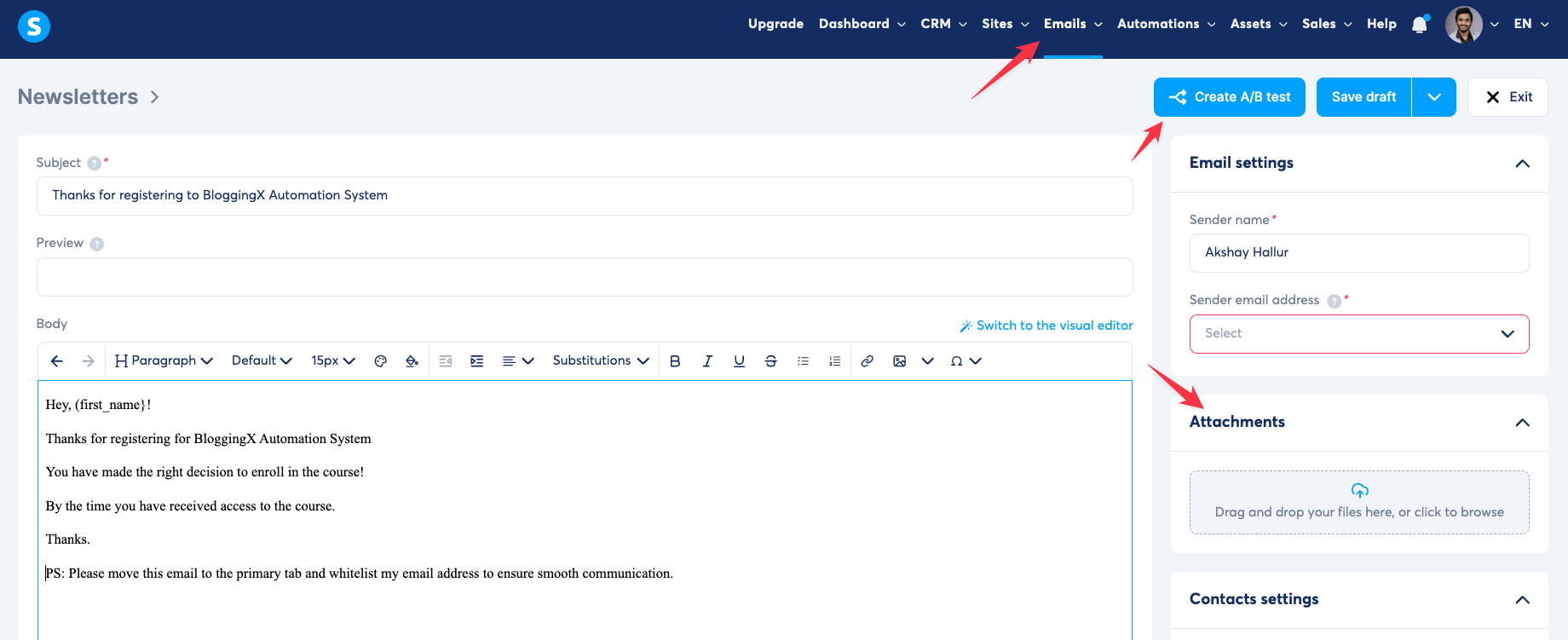
When it comes to their email builder, they have a visual drag-and-drop editor as well as a plain email editor.
I do prefer their plain email editor for simplicity.
And also, their email marketing connects directly to your sales funnels. So, when someone enters a funnel, email sequences trigger automatically based on their actions.
On the other hand, ClickFunnels gives you lots of email templates to pick from.

ClickFunnels also includes broadcast emails and follow-up sequences as part of their funnel system with better tagging and segmentation.

They also have a drag and drop builder where you can use different blocks to craft your email.
You can build more advanced automation triggers and complex email workflows that respond to specific actions in your funnels.
The downside?
No free email plan like Systeme offers. You pay right from the start.
🏆 Winner: Systeme. Its free unlimited emails for 2,000 contacts makes Systeme unbeatable for beginners. ClickFunnels offers superior automation and segmentation features, but requiring immediate payment creates a barrier that Systeme eliminates completely.
Course creation and management
How do these platforms handle course building?
Both platforms let you structure courses into modules, lessons, and lectures with video support.
Systeme gives you quick access to everything you need:
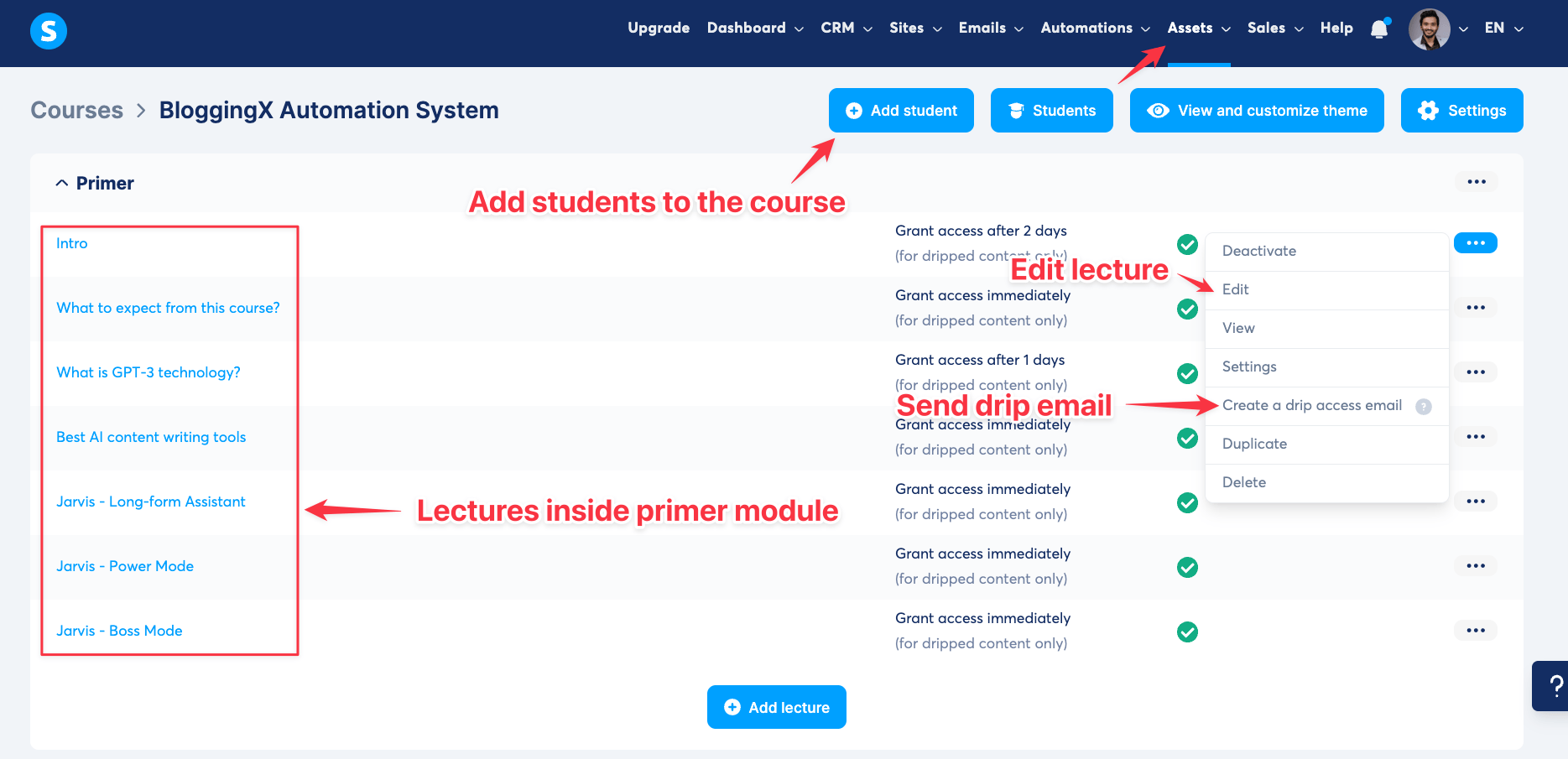
It offers drip-feeding course content at your chosen intervals, preventing student overwhelm.
Both platforms lack assessments and completion certificates, though Systeme lets you create basic quizzes with its survey block.
While ClickFunnels gives you more templates and design elements to make your courses look better.
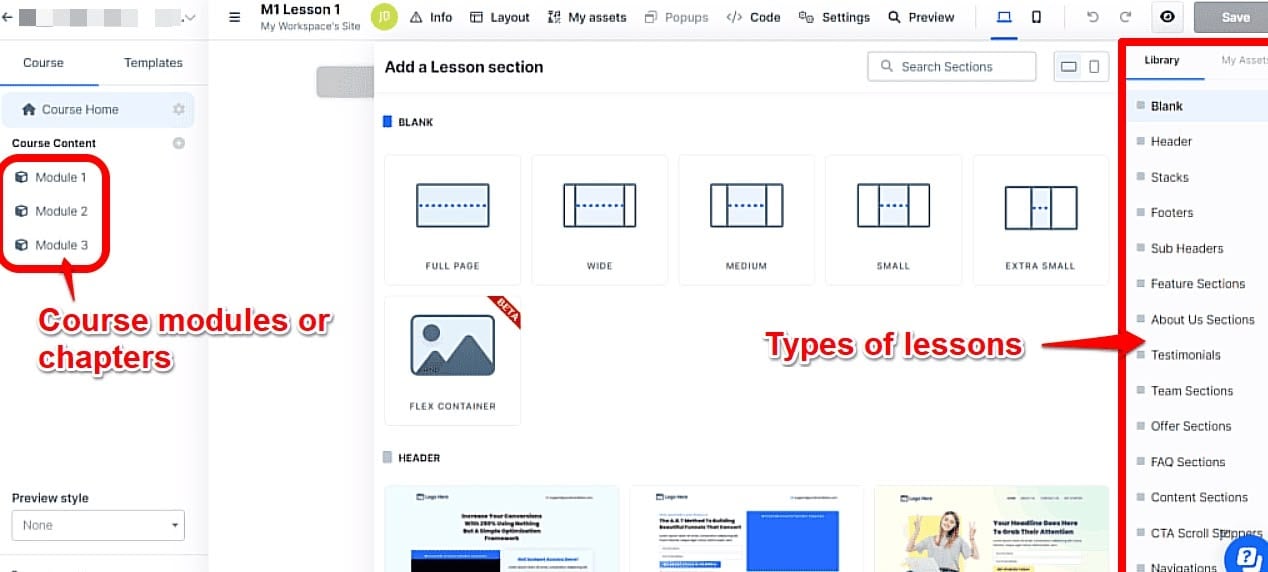
Their course builder offers superior branding control and visual presentation options to match your brand identity.
However, Systeme’s advantage is its comment areas within course modules where students can discuss topics and ask questions.
🏆 Winner: Systeme. Its built-in comment areas and community features create student engagement and interaction that ClickFunnels completely lacks. While ClickFunnels delivers prettier course design and better branding control, meaningful student connections matter more for completion rates.
Student course experience
The student experience significantly impacts course engagement and completion rates.

With Systeme, students can control the quality and the playback speed of videos.
Students can also access discussion areas.
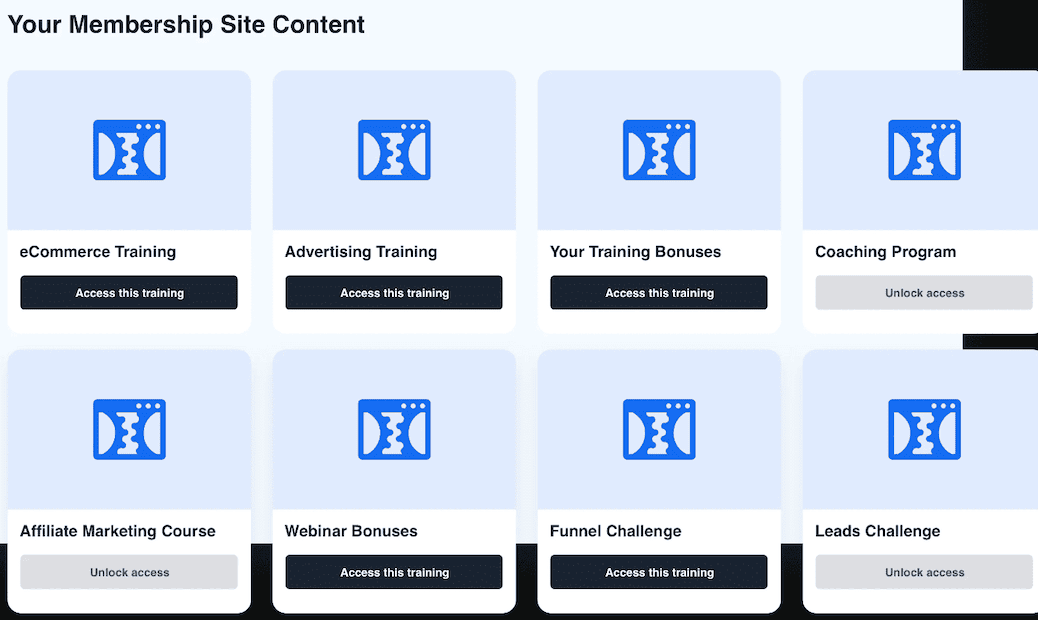
Whereas ClickFunnels delivers a polished visual experience
The design looks professional and branded.
Students can easily access all their courses, products, and memberships from one organized dashboard.
The big drawback?
No built-in community features. Students can’t comment or discuss lessons directly in the platform.
Need student engagement?
You’ll have to integrate with external community platforms like Circle.so or Mighty Networks.
🏆 Winner: Systeme. Its built-in discussion areas and video playback controls boost student engagement significantly. ClickFunnels offers superior visual polish and organized dashboards, but without community interaction, students feel isolated and completion rates suffer from lack of peer support.
Community vs membership tools
Systeme supports both public and private communities.
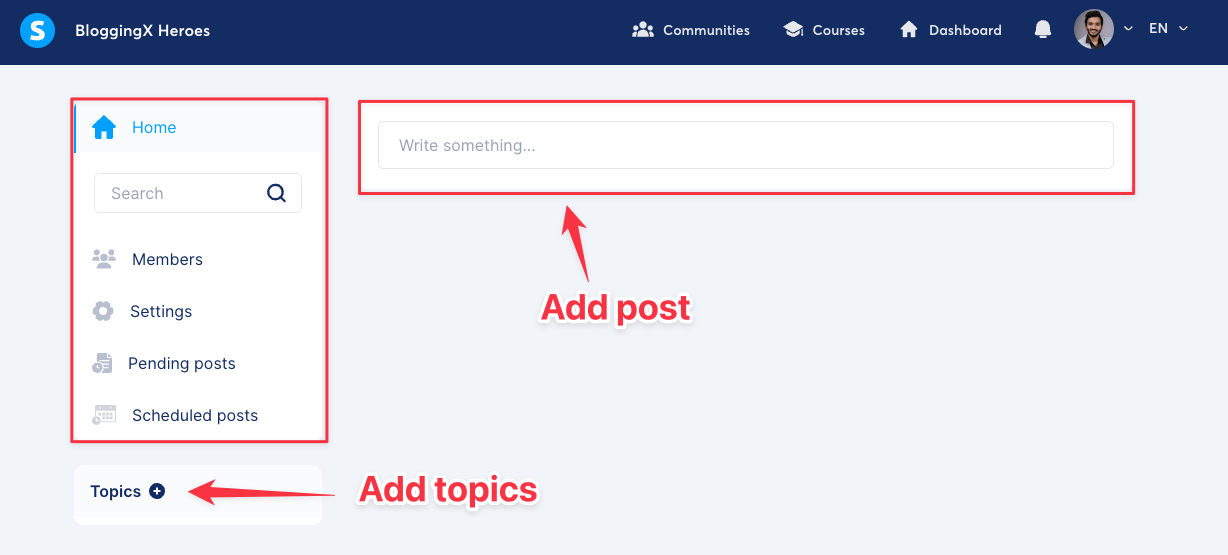
All members can post and comment.
You’ll get notifications when someone comments on your public posts.
You can also create two types of memberships:
- Paid memberships for recurring income
- Free memberships to share exclusive content with specific people
You can grant access by adding emails to private membership sites or sending invites to join.
On the other hand, ClickFunnels offers memberships called Membership funnels (not communities).
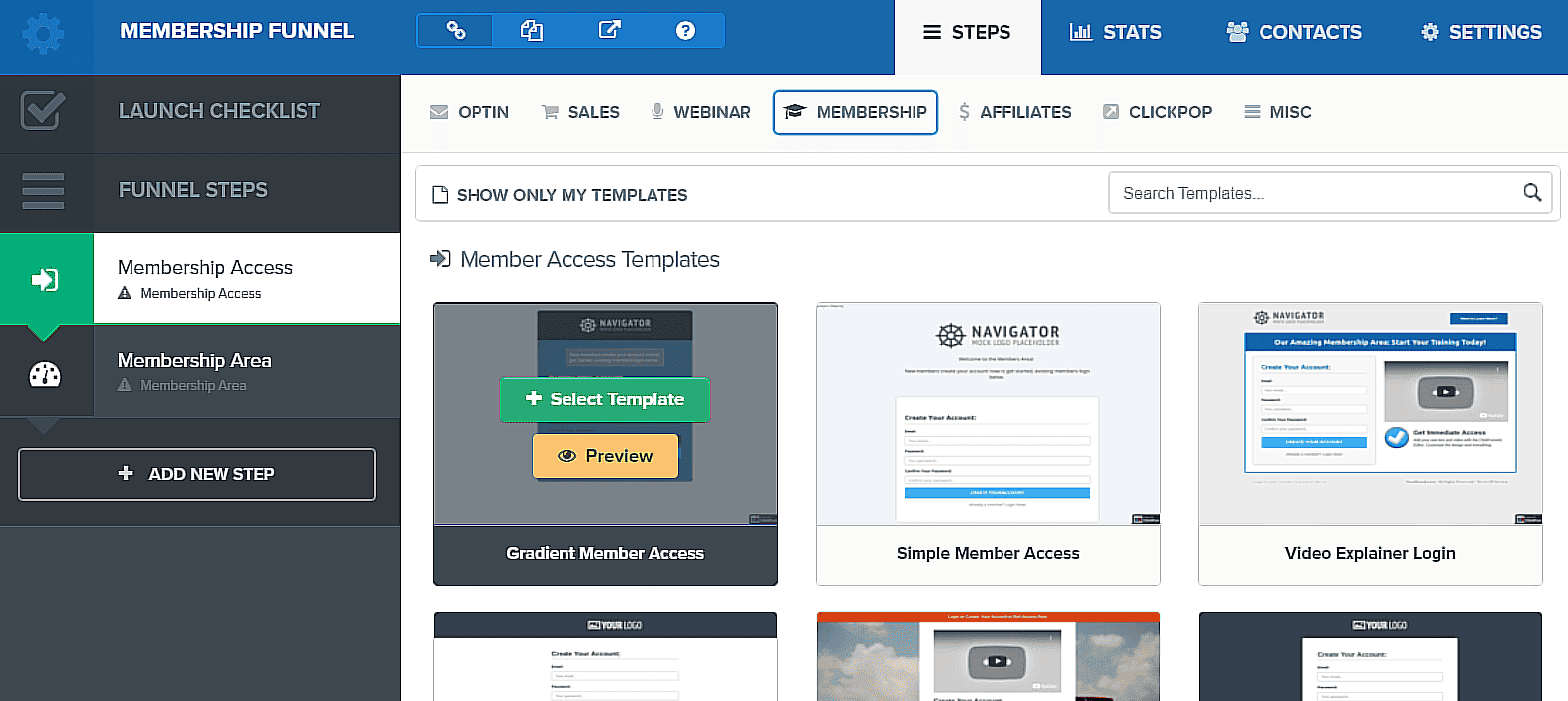
Creating a membership site with ClickFunnels is straightforward.
You use the Memberships Funnel like this:
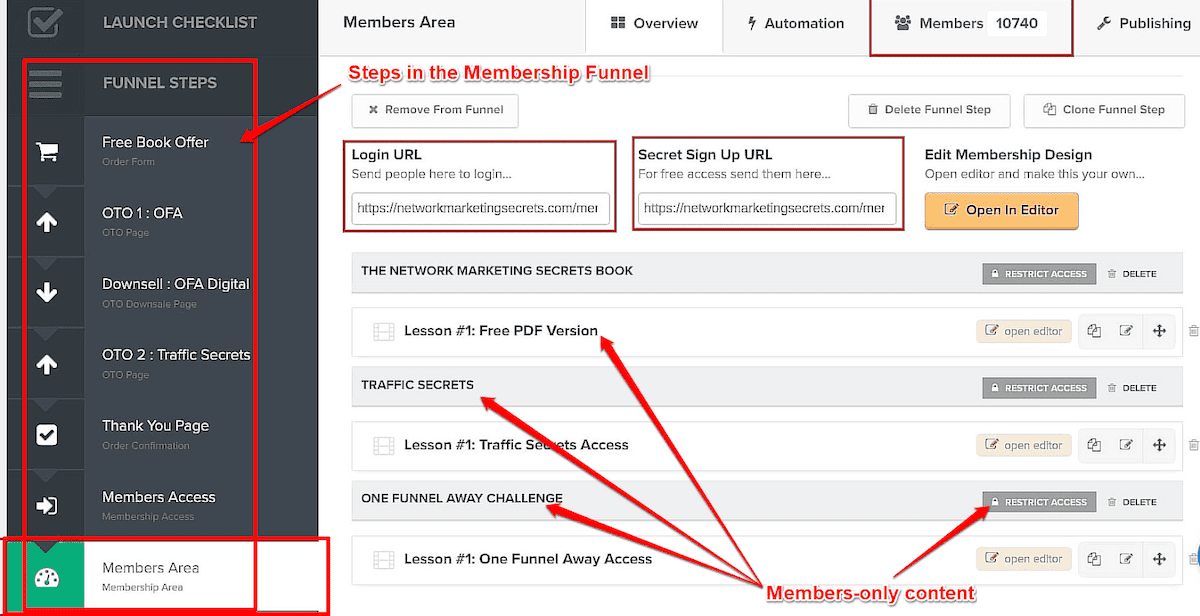
After building it, they can access the training by logging into the membership portal.
Unlike Systeme, ClickFunnels has no built-in community features for student interaction.
Need a community platform? You’ll have to use dedicated tools like community platforms such as Circle.so or Mighty Networks.
🏆 Winner: Systeme. It keeps things basic but friendly for community building. ClickFunnels doesn’t have built-in community features at all, but makes up for this gap with sleek, professional-looking membership areas.
Website and page building
Which platform has better website building tools? Let’s compare.
Systeme gives you a simple page builder for emails, funnel steps, websites, blogs, and checkout pages.
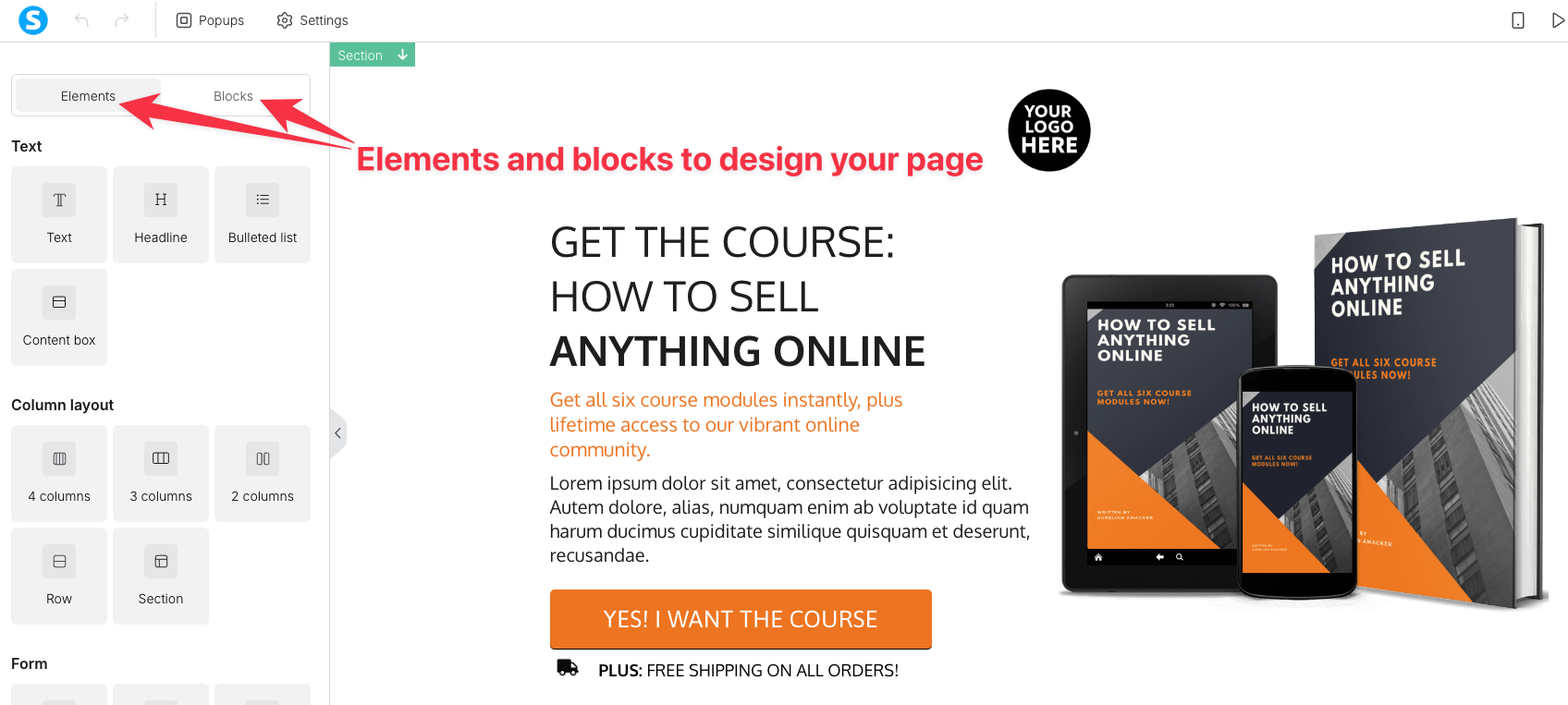
It’s easy to learn and comes with various elements and blocks to design your page.
For Systeme checkout pages, you can use their payment widgets for customization.
However, if you want to customise your sites, emails, and pages to look and feel consistent with your brand assets elsewhere, Systeme’s customisation options are rather limited.
Now, let’s look at ClickFunnels:
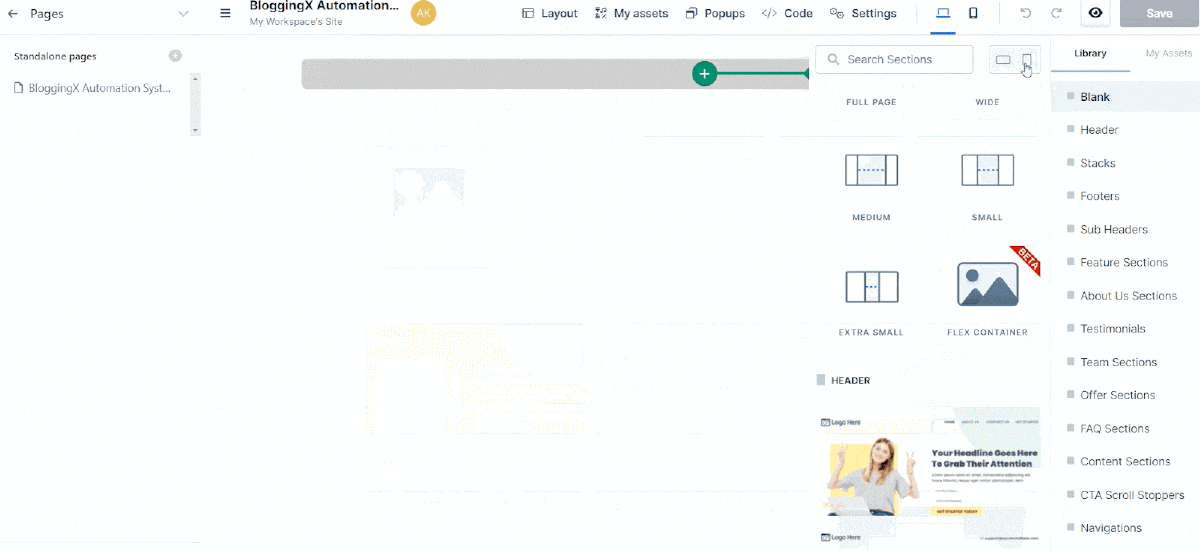
With ClickFunnels, you have the ability to use custom code and select from a variety of trendy templates.
🏆 Winner: ClickFunnels. Its advanced customization, custom code capabilities, and trendy templates help you create professional pages. Systeme gives you simple building tools but limits your brand customization options.
Analytics and reporting
Want to know what’s happening in your business?
Both platforms track performance differently.
Systeme tracks everything from conversion rates to course completion progress across your business.
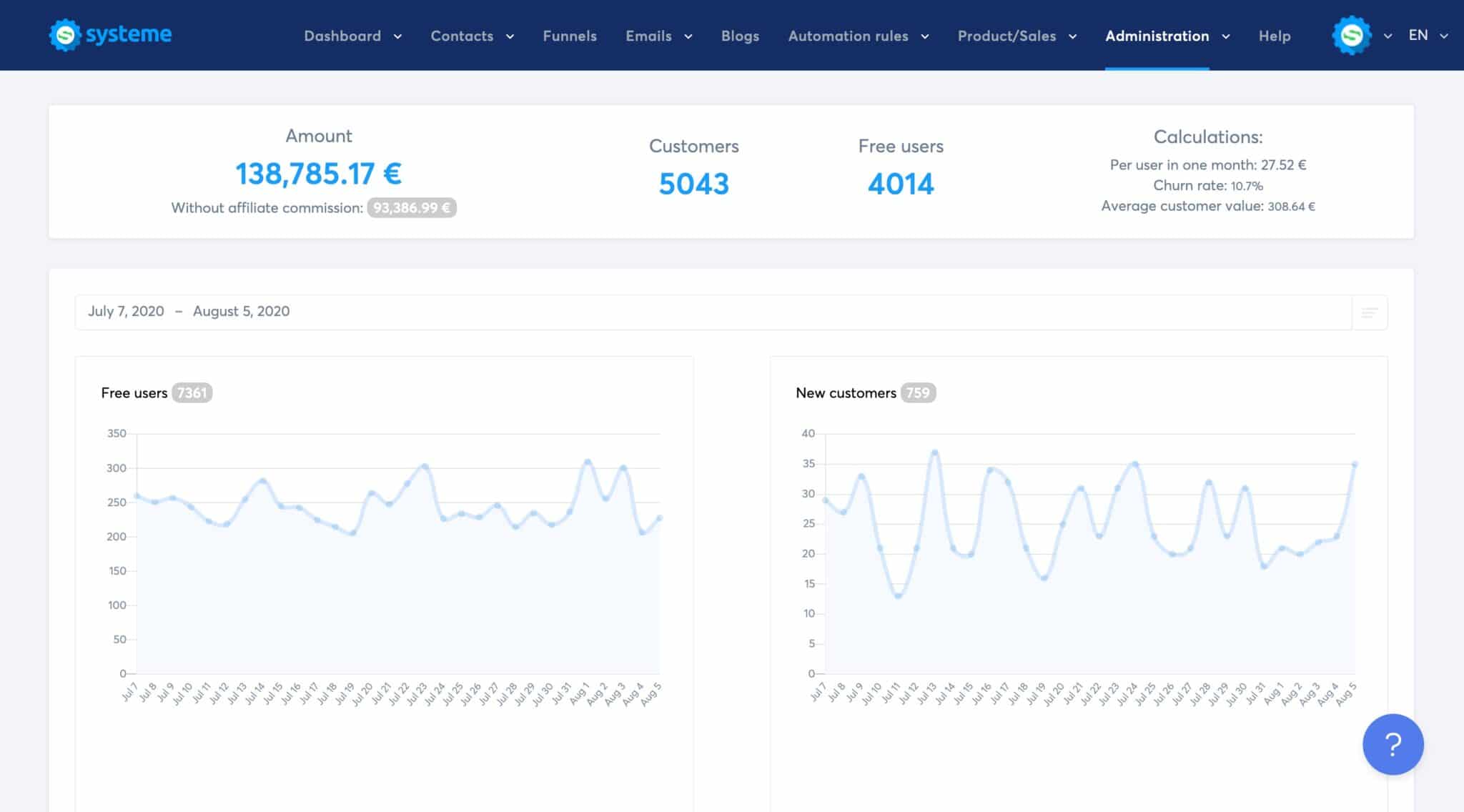
You can also get essential analytics for:
- Funnel performance metrics
- Email marketing stats
- Course completion rates
- Sales data
It’s straightforward and gives you what you need without complexity.
On the other hand, ClickFunnels offers more detailed reporting with live stats for events and funnels.
Here’s what it looks like:
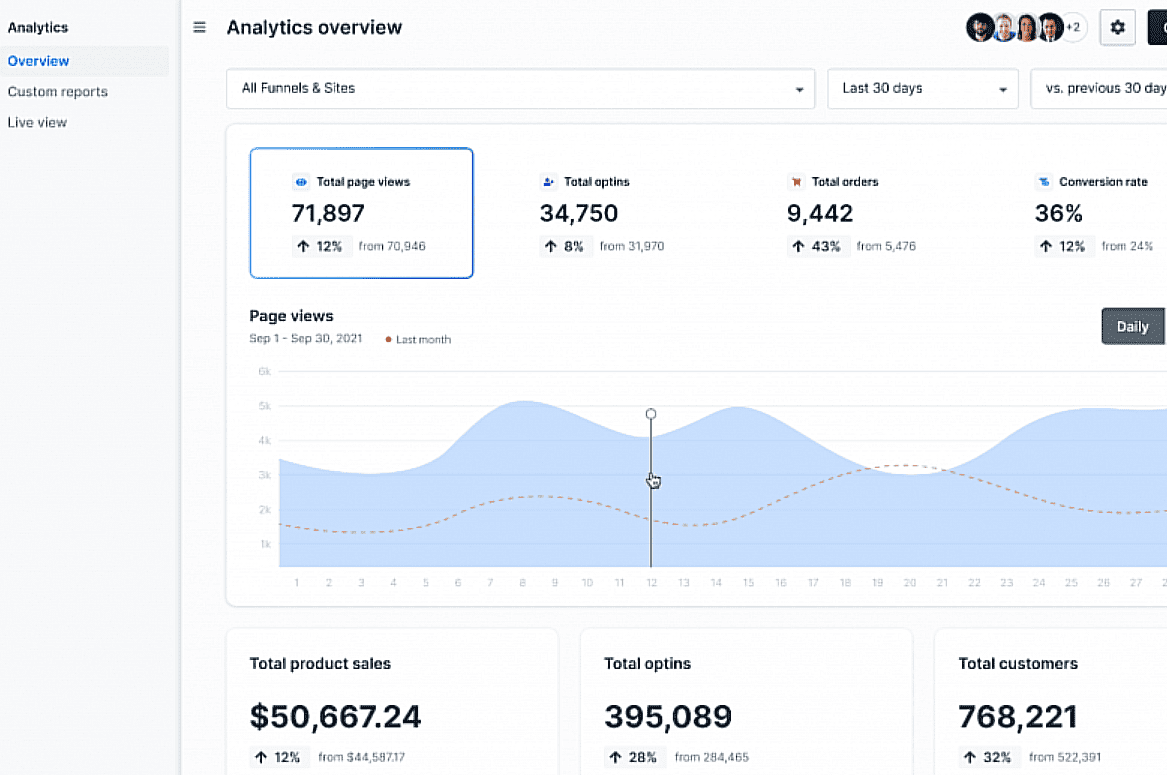
The dashboard displays key metrics at the top with a graph that correlates all data points.
ClickFunnels gives you:
- Live stats for real-time monitoring
- Detailed funnel analytics
- Advanced conversion tracking
- Better visual data presentation
- Deeper customer behaviour insights
These detailed reports help you make smarter decisions about what’s working and what needs fixing.
🏆 Winner: ClickFunnels. Its live stats, detailed funnel analytics, and advanced conversion tracking give ClickFunnels a clear edge over Systeme’s basic reporting.
Integrations and third-party tools
Need to connect other tools? Here’s what each platform offers.
Systeme connects with essential tools:
- Payment processors (Stripe, PayPal)
- Email services (basic connections)
- Zapier for additional automations
- Basic analytics tools
It covers the fundamentals but options are limited.
On the other hand, ClickFunnels offers more integrations than Systeme:
- Advanced CRM integrations
- Multiple payment gateways
- Email marketing platforms
- Webinar tools
- Analytics and tracking services
- Affiliate management systems
🏆 Winner: ClickFunnels. Its extensive integration options blow Systeme out of the water. You get advanced CRM systems, multiple payment gateways, and webinar tools that Systeme just can’t match with its basic Stripe and PayPal connections.
Pricing
Let’s talk money. Which platform gives you better value?
Systeme offers a free forever plan (robust and comprehensive) while ClickFunnels gives only a 14-day trial with a 30-day money-back guarantee.

Systeme’s unlimited plan costs $97/month compared to ClickFunnels’ $297/month and Kajabi’s $399/month.
A steal!
On the other hand.
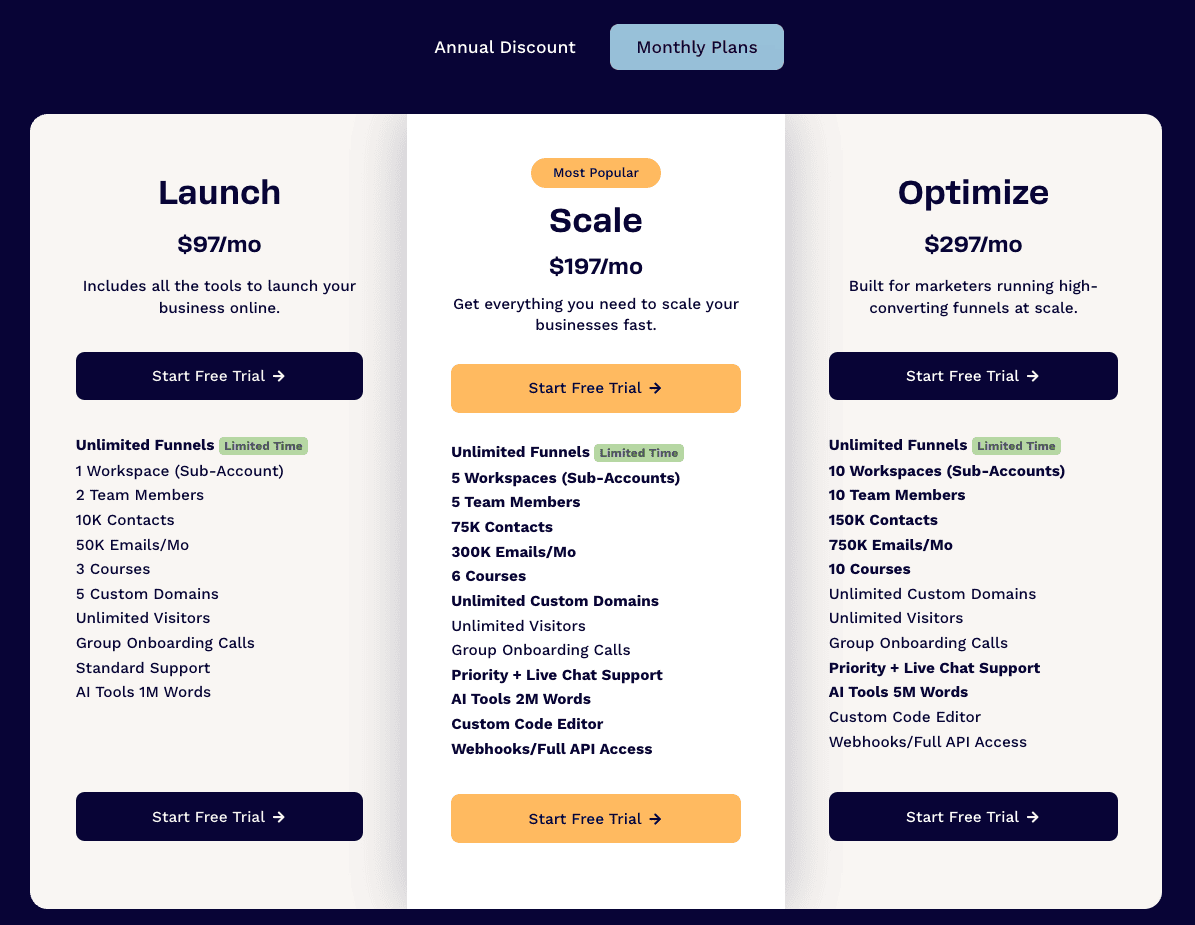
ClickFunnels’ unlimited subscription costs $297/month.
🏆 Winner: Systeme. Its comprehensive free forever plan plus $97/month unlimited plan demolishes ClickFunnels’ $297/month pricing. While ClickFunnels offers advanced features, Systeme delivers 80% of the functionality at one-third the cost for budget-conscious entrepreneurs.
Final verdict
Here’s the deal.
Choose ClickFunnels if you need sophisticated funnels with split testing, rich customisation, and advanced CRM functionality.
Select Systeme if you want an easy-to-use, affordable platform for small or medium-sized businesses without technical complexity.
My recommendation?
Start with Systeme if you’re beginning your online business journey. The free plan gives you everything to test your ideas without spending money.
Upgrade to ClickFunnels when you need advanced funnel capabilities, extensive customisation, and detailed analytics to scale your business.
I hope my experiences with ClickFunnels vs Systeme will help you make an informed decision you’ll be happy with in the long run.






